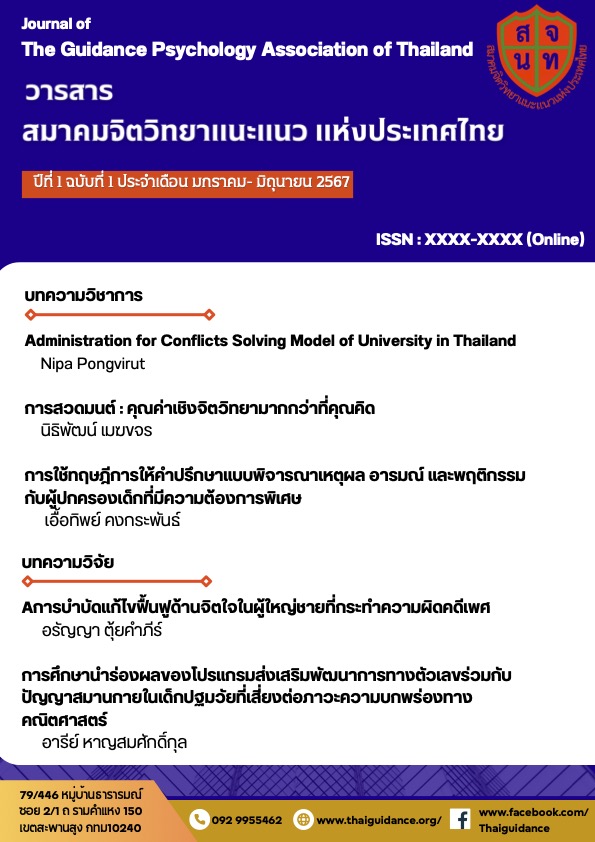Administration for Conflicts Solving Model of University in Thailand
คำสำคัญ:
Administration, Conflicts Solving, University in Thailandบทคัดย่อ
The purposes of this mixed methods research were: 1) to indicate administration for conflicts solving model 1. 2) to find the practice level of using administration methods and conflicts solving methods model 2. 3) to find the correlation between administration methods and conflicts solving methods model 3. 4) to find administration for conflicts solving model 4 that was developed and approved for the good practice model. The sample were 364 administrators from 28 universities all around the region of Thailand by cluster random sampling. Questionnaire 48 items with 5 rating scales reliability at .94 were used to collecting data. Statistical were mean, Person's product moment correlation and focus group for development and approved the administration for conflicts solving, good practice model we had found.
Summary of research finding: 1) the model 1 qualitative composed of administration methods 4 indicators and conflicts solving methods 6 indicators. 2) the model 2 quantitative was remodel by rotated indicators. 3) from the coefficient correlation we found the model 3. 4) from the focus group we found the model 4. The four highest of administration methods were leading, planning, organizing, and monitoring, conflicts solving methods were reduce differentiation, emphasize goals, improve communication, and clarify rules. That mean good practice model we had found.
เอกสารอ้างอิง
Cronbach, L. J. (1984). Essentials of psychological testing (4th ed.). Harper & Row.
Krejcie, R. V., & Morgan, D. W. (1970). Determining sample size for research activities. Educational and Psychological Measurement, 30(1), 607-610. https://doi.org/10.1177/0013164470030003010
McCrea, N., & Ehrich, L. (1999). Changing leaders’ educational heart. In Education management and administration (pp. xx-xx). Thousand Oaks, Sage.
McShane, S. L., & Glinow, M. A. V. (2009). Organizational behavior (4th ed.). McGraw-Hill.
Stewart, D. W., & Shamdasani, P. N. (1990). Focus group: Theory and practice. Sage.
ดาวน์โหลด
เผยแพร่แล้ว
รูปแบบการอ้างอิง
ฉบับ
ประเภทบทความ
สัญญาอนุญาต
ลิขสิทธิ์ (c) 2024 สมาคมจิตวิทยาแนะแนวแห่งประเทศไทย

อนุญาตภายใต้เงื่อนไข Creative Commons Attribution-NonCommercial-NoDerivatives 4.0 International License.
บทความที่ได้รับการตีพิมพ์เป็นลิขสิทธิ์ของ สมาคมจิตวิทยาแนะแนวแห่งประเทศไทย
ข้อความที่ปรากฏในบทความแต่ละเรื่องในวารสารวิชาการเล่มนี้เป็นความคิดเห็นส่วนตัวของผู้เขียนแต่ละท่านไม่เกี่ยวข้องกับสมาคมจิตวิทยาแนะแนวแห่งประเทศไทย และบุคลากรท่านอื่น ๆ ใน สมาคมฯ แต่อย่างใด ความรับผิดชอบองค์ประกอบทั้งหมดของบทความแต่ละเรื่องเป็นของผู้เขียนแต่ละท่าน หากมีความผิดพลาดใดๆ ผู้เขียนแต่ละท่านจะรับผิดชอบบทความของตนเองแต่ผู้เดียว



